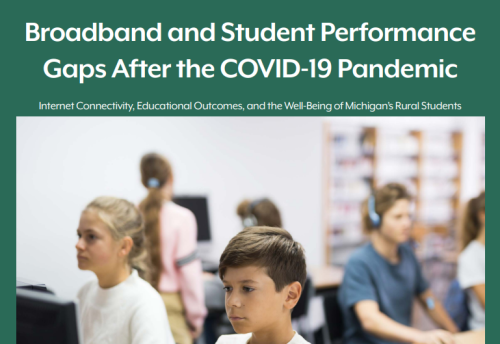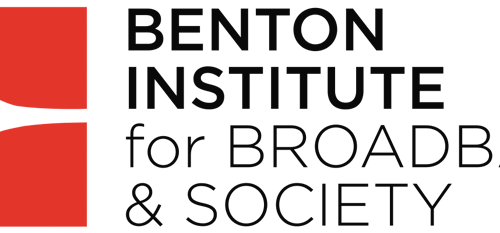The 2015 launch of Rocket Fiber is poised to add super-fast Internet connectivity to the expanding arsenal of revitalization tools available in Detroit, starting with the city’s downtown central business district, followed by neighboring areas such as Midtown and Corktown. This is an important and exciting development likely to begin reaping benefits in these areas over the next few years.
One of the more challenging sets of questions facing Rocket Fiber–and virtually every effort to revitalize Detroit–is whether and how the city’s rising tide of investment can positively impact those households and businesses most distant—both physically and economically– from the city’s expanding beachhead of tech-fueled growth.
This is one of a range of questions driving the Quello Center’s launch of the ICT4Detroit program.* Through this program, the Center aims to develop research projects and alliances to help address issues concerning how ICTs (information and communication technology) can support the revitalization of Detroit. High on the list of issues central to the ICT4Detroit research agenda is how can the benefits of high speed access and other ICT be brought to more of Detroit’s citizens and organizations.
A big challenge, and a big opportunity
On one hand, a growing body of research has shown that high-speed access and related ICT, such as mobile Internet and the Internet of Things, have potential to boost economic growth, civic life and the quality and accessibility of education, healthcare, transportation, public safety and other government services. Research has also shown that fiber’s nearly unlimited capacity, low maintenance costs, easy upgradability and backhaul support for high-speed wireless connectivity make it particularly well suited to serve as the core of a city’s communication infrastructure.
So why don’t we already have fiber deployed in every neighborhood in every city, including Detroit? The reason, as every network investor (whether private or public) knows, is that high-speed networks are expensive to build, with high fixed costs and business cases heavily influenced by density, take rates and average revenue per unit (ARPU). As a result, the economics of extending fiber beyond Detroit’s central core into areas with low income and relatively low housing density are especially challenging.
The result is a situation with potentially large and much needed social benefits, but also considerable risk and uncertainty for network investors. This high-payoff, high-risk combination cries out for strategies aimed at reducing uncertainty, risk and cost, while increasing the probability and magnitude of benefits for underserved and disadvantaged populations, including those that can help support network capital and operating costs.
In response to this need, the Quello Center has begun to develop an independent research program intended to support innovative and successful strategies for increasing the availability, affordability and benefits of high-speed Internet access in Detroit.
In doing so, we seek input, guidance, support and collaboration from Detroit’s leaders, businesses, technologists, citizens and community organizations working hard to revitalize the city, as well as from others in the research and philanthropic communities focused on digital divide-related issues.
As a first step, we invite feedback and suggestions on this draft outline of the research program we have in mind.
1. Examine the current status of availability, usage and benefits of broadband Internet access in Detroit’s neighborhoods: by individuals, households, businesses and “community anchor institutions” such as libraries, schools, healthcare facilities, non-profit organizations and neighborhood associations.
2. Explore the currently unmet potential demand for broadband connectivity and services by these various segments of the Detroit community, including price sensitivity, revenue potential and externalities.
3. Explore potential demand for high speed connectivity associated with the evolving Internet of Things (IoT), and how this evolution (and its benefits) could be expedited and enhanced by increased availability of fiber-enabled high speed connectivity.
4. Better understand economic and other barriers to expanding demand to levels sufficient to justify network expansion deeper into the city’s neighborhoods, as well as factors with potential to help overcome these barriers.
5. Identify, characterize and prioritize potential near-term and longer-term opportunities to economically expand the reach of affordable and high speed access and IoT connectivity in Detroit, especially in ways that promote economic growth and community development in the city’s economically distressed neighborhoods.
6. Explore creative business strategies (e.g., demand aggregation, pre-subscriptions); technology options (e.g., wireless extensions, low-cost fiber installation techniques); alliances (e.g., with local community organizations and efforts to promote digital literacy); funding sources and strategies, and; local zoning and other public policies with potential to support economically viable expansion and beneficial use of high-speed connectivity in these neighborhoods.
In terms of methodology, we would expect this research to include in-depth interviews with key stakeholders and experts, quantitative surveys of citizens, businesses and community anchor institutions, and financial analysis of alternative strategies and scenarios.
The Quello Center views such research as a potential pillar of its ICT4Detroit initiative, focusing as it does on the key issue of making high-speed access more available, affordable and attractive in a city currently burdened by large economic challenges and low Internet penetration, yet with much potential to benefit from cost-effective expansion of broadband access and usage. A significant stream of prior research has focused on the role of ICT, and the Internet in particular, in social and economic development of urban areas. However, relatively little has focused on the particular historical, social and economic circumstances of Detroit.
We welcome your input and support as we seek to explore the unique Detroit factors shaping the role of broadband connectivity and other ICT in the revitalization of this great American city.
Mitch Shapiro and Bill Dutton, Quello Center
Notes



